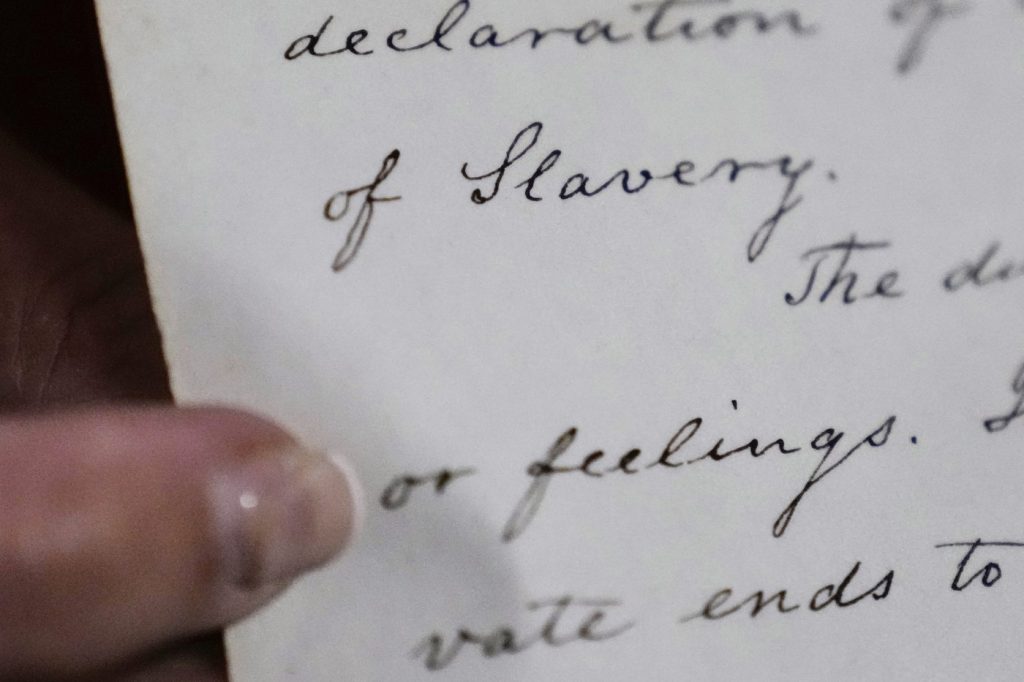GROTON, Mass. (AP) – In May, retired teacher Jennifer Cromack made a remarkable discovery while volunteering at the American Baptist archive in Groton, Massachusetts. While sorting through a collection of 18th and 19th-century journals, she stumbled upon a slender box that contained a 5-foot-long (1.5-meter-long) handwritten scroll titled “A Resolution and Protest Against Slavery.” This significant document, signed by 116 ministers from New England, was adopted on March 2, 1847, in Boston.
American Baptist officials had feared this crucial anti-slavery declaration was lost forever after unsuccessful searches at various prestigious institutions, including Harvard and Brown universities. The last known reference to it appeared in a 1902 history book. Cromack expressed her excitement upon discovering the scroll, emphasizing its importance to both state and national discourse on justice and human rights.
The document serves as a historical insight into the growing debate surrounding slavery in the Northeastern United States during the 18th century. Signed just 14 years prior to the outbreak of the Civil War, it reflects a pivotal moment when religious leaders began to vocalize their opposition to slavery amidst a turbulent societal backdrop.
The scroll also highlights a significant turning point within the Baptist church. It emerged shortly after a major schism in 1845, when Southern Baptists broke away from their Northern counterparts to form the Southern Baptist Convention. This division was largely precipitated by a resolution from the American Baptist Foreign Mission Society, which prohibited slaveholders from serving as missionaries. Ultimately, the Northern Baptists evolved into what is now known as the American Baptist Churches USA.
Rev. Mary Day Hamel, the executive minister of the American Baptist Churches of Massachusetts, noted the urgency of the document's message, considering the societal context leading up to the Civil War. She highlighted the exceptional stance taken by Massachusetts Baptists, framing it as part of their ongoing legacy of advocating for justice and embracing diversity.
Deborah Bingham Van Broekhoven, former executive director of the American Baptist Historical Society, remarked that many individuals in the North were ambivalent about slavery at the time, often viewing it as a Southern issue best left untouched. This reluctance made the ministers' collective action especially bold and diplomatic. The scroll conveys their belief that a societal reform surrounding slavery was necessary, and their decision to stand against what they characterized as a fundamentally unjust system was essential to fulfilling moral and ethical obligations.
The ministers stated in their declaration that they could not harbor any sympathy for the institution of slavery, citing its detrimental impact on human rights and the overall well-being of individuals. Their resolve to speak out against slavery is encapsulated in poignant statements from the document emphasizing their commitment to truth, humanity, and justice.
Rev. Diane Badger, an administrator at the American Baptist Church of Massachusetts, collaborated with Rev. John Odams of the First Baptist Church in Boston to catalog the names of the ministers who signed the resolution, dubbing it the “Holy Grail” of abolitionist-era Baptist documents. Among these signers was Nathaniel Colver, pastor of Tremont Temple in Boston, one of the nation’s first integrated churches. Another significant figure was Baron Stow, a member of the Massachusetts anti-slavery society.
Efforts are underway to assess the scroll’s historical value and ensure its preservation, with plans for a digital copy to be shared across Massachusetts’ 230 American Baptist churches. Badger expressed her curiosity about the individuals who chose not to sign the document, presenting a fascinating avenue for further research into the attitudes of that era.
Rev. Kenneth Young of Calvary Baptist Church in Haverhill, a predominantly Black congregation established by freed individuals in 1871, described the discovery as inspiring. He emphasized the importance of the document in reinforcing the narrative of freedom and the ongoing battle against systemic racism, celebrating the commitment of those who signed the resolution in support of justice.











